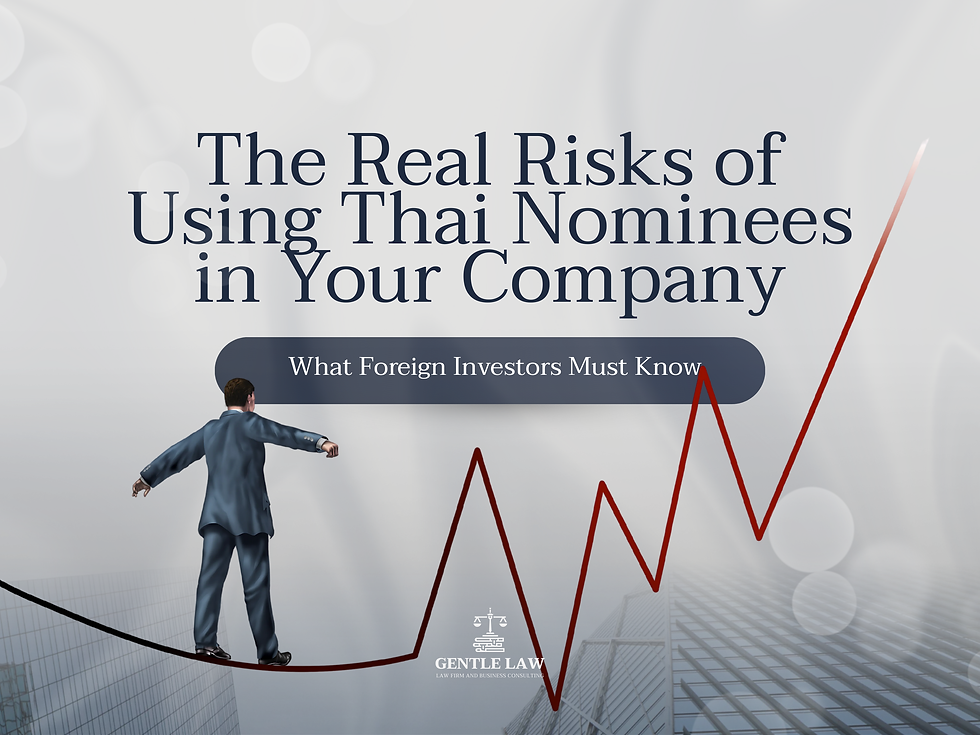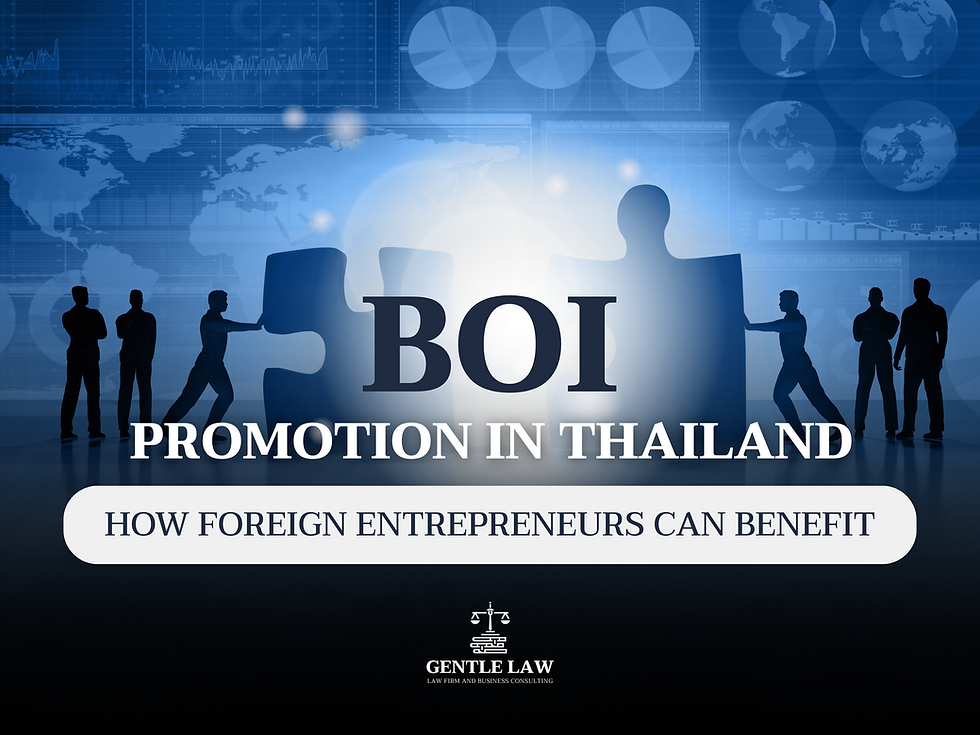The Real Risks of Thai Nominee Structures in Thailand: What Foreign Investors Must Know
- gentlelawlawfirm
- Jul 11, 2025
- 3 min read
Updated: Jul 13, 2025

Introduction
For foreign entrepreneurs establishing a business in Thailand, using Thai Nominee Structures Thailand can appear to be a convenient solution to meet shareholding requirements. Some advisers may suggest:
"Simply register 51% under a Thai person, but you still keep full control."
This approach is not only illegal under the Foreign Business Act B.E. 2542 (1999) but can result in severe penalties, including criminal prosecution, business closure, and deportation. This guide by GENTLE LAW IBL explains what nominee structures are, why they violate Thai law, and what legal alternatives you can consider.
What Are Thai Nominee Structures Thailand?
A nominee shareholder is a Thai national who holds company shares in name only on behalf of a foreign individual or entity. Typically, nominees:
Do not invest their own funds
Have no economic interest in profits or losses
Follow instructions from the foreigner on all decisions
Sign agreements without genuine control or consent
Under Section 36 of the Foreign Business Act, this arrangement is expressly prohibited.
Why Are Nominee Structures Illegal in Thailand?
Thai Nominee Structures Thailand are banned because they attempt to disguise foreign control of businesses operating in restricted sectors. The law defines foreign control based on:
Shareholding exceeding 49%
Voting rights disproportionate to shareholding
Financial arrangements indicating actual foreign control
Management power held by the foreign party
Any structure where a Thai holds shares but the foreigner retains real authority is a violation of the law.
Penalties for Using Thai Nominee Structures Thailand
If authorities determine that your company relies on illegal nominees, you face:
For the Company:
Forced business closure
Revocation of licenses and registrations
Asset seizure under certain circumstances
For the Foreign Directors or Shareholders:
Fines up to THB 1 million
Imprisonment up to 3 years
Deportation and blacklisting
For the Thai Nominees:
Criminal prosecution for fraud and conspiracy
Personal liability for damages
How Authorities Detect Thai Nominee Structures
Thai regulators are increasingly active in detecting nominee arrangements. Common red flags include:
Thai shareholders with no verifiable financial capacity to invest
Thai shareholders employed by or related to the foreigner
Identical contact information for all Thai shareholders
Voting or profit distribution that contradicts shareholding proportions
Capital contributions made by foreigners on behalf of Thais
Undisclosed agreements transferring control
Investigations may involve:
Interviews with all shareholders and directors
Audits of financial records and transactions
Site visits to confirm genuine operations
Illegal Workarounds That Fail
Some promoters offer "legal cover" for nominee structures. Here is why they remain illegal:
Workaround | Why It Fails |
Loan agreements from Thai to foreigner | Treated as evidence of fake ownership |
Holding shares via Thai spouse | Still foreign shareholding if controlled |
Silent partnerships or trusts | Not recognized under Thai company law |
Side agreements transferring voting | Invalid under Thai Foreign Business Act |
Legal Alternatives to Thai Nominee Structures Thailand
You do not need to break the law to operate your business effectively. Consider these legitimate options:
1. BOI Promotion
Obtain full foreign ownership in eligible sectors
Bypass Foreign Business Act restrictions
Enjoy tax and visa incentives
2. U.S.–Thailand Treaty of Amity (U.S. Citizens Only)
Allows 100% U.S. ownership
Requires registration with the Department of Business Development and U.S. Commercial Service
3. Genuine Thai Partnership
Partner with real Thai investors
Use preference shares and shareholder agreements to maintain control
Ensure all arrangements comply with Thai Civil and Commercial Code
4. International Holding Company
Incorporate a holding company in Singapore or Hong Kong
Structure ownership for compliance and tax efficiency
Seek professional advice on cross-border corporate governance
Why Legality Matters
Businesses built on Thai Nominee Structures Thailand face serious risks:
You cannot enforce contracts or ownership rights
You cannot obtain reputable investors
You cannot exit or sell legally
You risk losing everything if authorities investigate
How GENTLE LAW IBL Can Help
GENTLE LAW IBL offers comprehensive support:
Conclusion
Tempting shortcuts like Thai Nominee Structures Thailand expose your business to legal, financial, and operational disaster. If you are committed to building a sustainable, investable company in Thailand, do it right from the start.
Contact GENTLE LAW IBL today to schedule a confidential consultation with our legal team.
TAG : NON - B VISA



